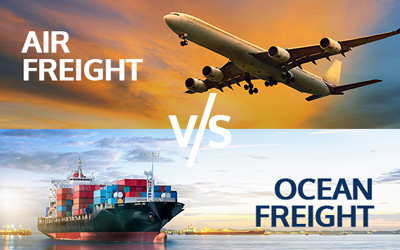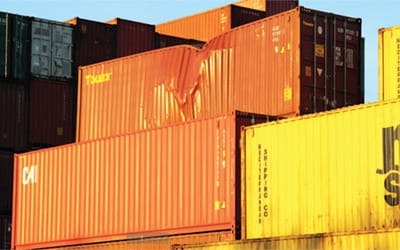Sea Or Air Freight The Differences
Freight, in simple terms, refers to the transportation of goods from one place to another, typically over long distances. When it comes to international shipping, two primary modes of freight transportation dominate the industry: Sea Freight or Air Freight. Understanding the differences between these two modes is crucial for businesses looking to optimize their logistics operations and could ultimately save you thousands over the year.
Cost Comparison
In terms of cost, Sea Freight generally offers lower initial costs compared to Air Freight. However, it’s essential to consider operational costs and additional charges. While Sea Freight may seem economical upfront, factors such as longer transit times and potential delays can add to operational expenses, accentuated in 2024 as the Yemen’s Houthi rebels are targeting commercial vessels in the Red Sea causing price hikes.
On the other hand, Air Freight may have higher upfront costs but can be more cost-effective for time-sensitive shipments.
Speed of Delivery
 Air Freight is renowned for its speed of delivery, offering significantly shorter transit times compared to Sea Freight. While Sea Freight can take weeks or even months to reach its destination, Air Freight can deliver goods within days, making it the preferred choice for perishable or high-value items. Air freight epitomizes speed, ensuring swift deliveries for time-sensitive shipments. Industries reliant on urgency, such as Technology, Aviation, Fashion, and Pharmaceutical goods, benefit from its rapid transportation capabilities.
Air Freight is renowned for its speed of delivery, offering significantly shorter transit times compared to Sea Freight. While Sea Freight can take weeks or even months to reach its destination, Air Freight can deliver goods within days, making it the preferred choice for perishable or high-value items. Air freight epitomizes speed, ensuring swift deliveries for time-sensitive shipments. Industries reliant on urgency, such as Technology, Aviation, Fashion, and Pharmaceutical goods, benefit from its rapid transportation capabilities.
Reliability
Reliability is a critical factor in freight transportation. While both Sea Freight and Air Freight strive for reliability, various factors can impact it. Sea Freight may face challenges such as adverse weather conditions, port congestion’s, vessel breakdowns, or attacks from Houthi pirates leading to delays.
Air Freight, on the other hand, is less susceptible to such issues, offering higher reliability levels, especially for time-sensitive shipments like pharmaceutical supplies.
Suitability for Different Cargo
The type of cargo being shipped also plays a significant role in choosing between Sea or Air Freight. Sea Freight is ideal for transporting bulky or heavy goods in large quantities, such as machinery or raw materials. In contrast, Air Freight is more suitable for smaller shipments, perishable goods, or high-value items that require quick delivery.
Environmental Impact
 Concerns about environmental sustainability have led to a comparison of the carbon footprints of Sea Freight and Air Freight. While Sea Freight generally has a lower carbon footprint per ton of cargo transported, Air Freight emits significantly more CO2 per kilogram due to the fuel-intensive nature of aviation.
Concerns about environmental sustainability have led to a comparison of the carbon footprints of Sea Freight and Air Freight. While Sea Freight generally has a lower carbon footprint per ton of cargo transported, Air Freight emits significantly more CO2 per kilogram due to the fuel-intensive nature of aviation.
Flexibility
Flexibility in transportation is essential for businesses dealing with changing market demands or unexpected disruptions. Sea Freight may offer more flexibility in terms of accommodating changes in schedules or handling special cargo, thanks to its larger capacity and less stringent regulations compared to Air Freight.
Insurance and Liability
Understanding insurance coverage and liability issues is crucial for mitigating risks in freight transportation. While both Sea Freight and Air Freight offer insurance options, the coverage and claim procedures may vary significantly between the two modes. It’s essential for businesses to assess their specific needs and choose the appropriate insurance coverage accordingly.
Customs Clearance
 Navigating customs clearance procedures is a critical aspect of international shipping. Sea Freight and Air Freight have distinct documentation requirements and clearance timeframes. While Sea Freight shipments may undergo longer clearance processes due to the volume of cargo, Air Freight offers faster customs clearance, facilitating quicker delivery times.
Navigating customs clearance procedures is a critical aspect of international shipping. Sea Freight and Air Freight have distinct documentation requirements and clearance timeframes. While Sea Freight shipments may undergo longer clearance processes due to the volume of cargo, Air Freight offers faster customs clearance, facilitating quicker delivery times.
Infrastructure Requirements
The infrastructure needed to support Sea Freight and Air Freight operations differs significantly. Sea Freight relies on ports, shipping lanes, and vessels capable of transporting large quantities of cargo. In contrast, Air Freight requires access to airports, cargo terminals, and aircraft capable of handling various types of goods efficiently.
Security
Ensuring the security of freight shipments is paramount to safeguarding valuable cargo and preventing potential threats such as theft or terrorism. Both Sea Freight and Air Freight implement security measures to mitigate risks, although Air Freight may offer tighter security protocols due to the nature of aviation regulations. Sea Freight is proving to be a higher risk currently with the Houthi attacks causing shipping companies billions in insurance and fuel costs due to re routing.
Market Trends
Understanding market trends and industry developments can help businesses stay competitive in the freight transportation sector. While Sea Freight remains a dominant mode for bulk cargo and global trade, Air Freight is witnessing growth in demand, driven by e-commerce, perishable goods, and time-sensitive shipments.
Regulatory Compliance
Compliance with international regulations and trade agreements is essential for seamless freight transportation across borders. Both Sea or Air Freight must adhere to regulatory standards governing customs procedures, safety protocols, and environmental regulations, ensuring compliance and minimizing disruption.
Customer Service
 Effective communication and support offerings are crucial for ensuring a positive customer experience in freight transportation. Businesses rely on transparent communication channels, responsive customer support, and efficient problem-solving to address issues and maintain client satisfaction. Which is why it’s crucial to choose a reputable and reliable logistics company with good communication to ensure your goods are delivered without delay. SARR logistics UK pride ourselves on our customer service and communication.
Effective communication and support offerings are crucial for ensuring a positive customer experience in freight transportation. Businesses rely on transparent communication channels, responsive customer support, and efficient problem-solving to address issues and maintain client satisfaction. Which is why it’s crucial to choose a reputable and reliable logistics company with good communication to ensure your goods are delivered without delay. SARR logistics UK pride ourselves on our customer service and communication.
Conclusion
In conclusion, Sea or Air Freight offer distinct advantages and considerations for businesses engaged in international shipping. While Sea Freight may be more cost-effective for bulky or non-perishable cargo, Air Freight excels in speed, reliability, and flexibility for time-sensitive shipments. Ultimately, choosing the right mode of freight transportation depends on factors such as cargo type, delivery deadlines, budget constraints, and sustainability goals.
If in doubt ask the experts, by using a logistics company you can talk to will relieve a lot of tension around getting your cargo where it should be on time. knowledge is power, knowing how to clear your goods through customs or getting your goods to you faster will improve your customer service, and ultimately your profits over the financial year.
FAQs
Q: Which is cheaper, Sea or Air Freight?
A: Sea Freight generally offers lower initial costs, but Air Freight can be more cost-effective for time-sensitive shipments due to shorter transit times.
Q: Is Air Freight more environmentally friendly than Sea Freight?
A: While Sea Freight has a lower carbon footprint per ton of cargo transported, Air Freight emits more CO2 per kilogram due to the fuel-intensive nature of aviation.
Q: How long does it take for Sea Freight and Air Freight shipments to clear customs?
A: Sea Freight shipments may undergo longer clearance processes due to the volume of cargo, whereas Air Freight offers faster customs clearance, facilitating quicker delivery times.
Q: What types of cargo are suitable for Sea Freight and Air Freight?
A: Sea Freight is ideal for transporting bulky or heavy goods in large quantities, while Air Freight is more suitable for lighter and smaller cargo.
SARR Logistics UK
If you are looking for a freight forwarding company, the choice of SARR Logistics UK stands as a testament to reliability, proficiency, and unwavering commitment. With a legacy built on trust, backed by extensive experience, a global network, and a customer-centric approach, SARR Logistics UK emerges as the ultimate partner for all your freight forwarding needs.
Reach out to us today and experience a seamless, efficient, and dependable shipping solution tailored to elevate your business. For further inquiries and to explore how SARR Logistics UK can revolutionize your shipping experience, contact our team today and embark on a journey of unparalleled logistical efficiency.
Remember, when it comes to freight forwarding excellence, SARR Logistics UK sets the benchmark!









